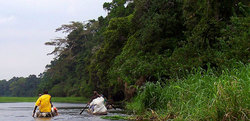Lessons need to be learned to transform Africa's ‘resource curse’ into a ‘resource blessing’ and to mitigate against the negative impacts of large land-based investments. Ways forward, which include addressing land tenure and bringing about sustainable development, point to the need for African solutions to the problem, supported by continent-wide ‘frameworks.’

While the recent rush for land is global in scope, continent-wide frameworks, and well-resourced and respected initiatives to ensure their implementation, have a strong role to play in this transformation as long as they are implemented in a way that reflects local realities and are ‘owned’ by national citizens and governments. These were some of the messages I took away from the 8th African Development Forum held in Addis Ababa last week.
Carlos Lopes, UN Under-Secretary and Executive Secretary of the United Nations Economic Commission for Africa (UNECA), reported that Africa is home to seven out of the ten fastest growing economies in the world, yet simultaneously home to six out of the ten most unequal societies in the world. This growth in inequality and persistent poverty is of growing concern.
Too many companies and non-African economies and government elites have got rich at the expense of rural citizens in resource-rich countries. Reversing this trend once and for all and transforming these riches into a ‘resource blessing’ is an urgent task. Sierra Leone's GDP growth forecast for 2012 is 21% due to commencing iron-ore extraction (compared to non-iron-ore growth of 6.3%) – imagine what a difference harnessing some of that wealth to develop health and education services could make.
While several mining initiatives have made progress (Extractive Industries Transparency Initiative, The Africa Peer Review Mechanism, The Africa Mining Vision), it is now well recognised that transparency alone will never be enough. Countries need a wider set of approaches to securing local resource rights and benefit sharing and engaging a wider number of stakeholders.
Speakers and delegates agreed that “Harnessing and governing natural resources for Africa’s development” (the forum’s official title) requires seriously tackling the bottlenecks that limit African governments maximising revenues from resource extraction, and ensuring their equitable distribution, and addressing both social and environmental issues in an integrated manner. They’re all lofty goals: sadly, setting goals is easier than implementing them.
National laws are too often contradictory, and investments can often undermine strategies in another. In a presentation on large-scale land acquisitions in Cameroon, Samuel Nguiffo of the Centre for Environment and Development showed a map of an Oil Palm Concession that overlapped with a mining concession and several major protected forest areas, illustrating the potential for agricultural concessions to undermine biodiversity objectives. He calculated that the forest resources in the protected areas to be lost to the oil palm concession could generate a potential 18 billion Central African CFA francs in carbon credits, while the oil palm concession rents would only generate 900 million CFA (although the time scale for the calculations or the basis of the carbon credits calculations wasn’t revealed). This showed, he said, that there was a financial rationale for a more integrated resource management approach. Furthermore, the state was potentially exposing itself to reputational risk and costly arbitration proceedings with investors. He called for a clear development vision so that the development of land resources was based on bottom-up land use planning rather than investors taking the lead in driving negotiations to meet their needs.
The roundtable on large-scale land based investments was organised by the Land Policy Initiative (LPI), which was set up to build African solutions to challenges such as these. The initiative aims to support governments in implementing the Framework and Guidelines on Land Policy in Africa. Under this initiative a Nairobi Plan of Action was developed to address the questions and controversy around large-scale land-based investments, including regional assessments and capacity development support to governments, traditional authorities and civil society on managing land-related investments. The LPI is seeking to make the African Union commitment to ensuring equitable access to land and related resources among all land users, including young people and other landless and vulnerable groups, such as displaced persons and women, a reality.
A challenge, of course, is the time it takes to bring about legal and policy reforms, in a context of rapid change and investor interest. This is one reason why a number of civil society actors have called for moratoria on large land acquisitions until the necessary regulatory frameworks are in place.
In the meantime, the LPI team have mobilised a strong network of partners and collaborators to realise the vision of strong land governance in Africa. Now, when African governments realise they need land reform and they need help in designing and implementing it and with managing investments in the interests of local citizens, they know who to look to for guidance.
Such initiatives are critical for promoting broad-based engagement in designing and implementing national land policies with complex political and technical dimensions, and ensuring regional frameworks are implemented in a way which reflects local realities.













